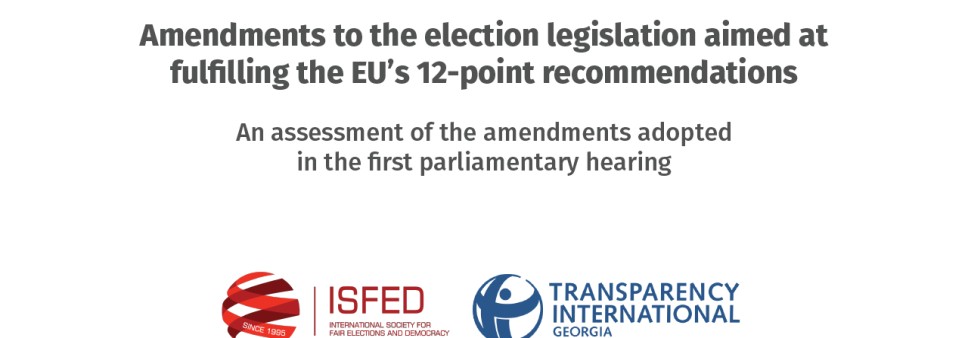Amendments to the election legislation aimed at fulfilling the EU’s 12-point recommendations: An assessment of the amendments adopted in the first parliamentary hearing
In March 2022, Georgia submitted an official application for EU membership, and in June, the European Council requested the Georgian government to implement 12 recommendations for obtaining the status of a membership candidate. One of the recommendations was related to election issues stating that Georgia should address all shortcomings identified by the OSCE/ODIHR and the Council of Europe/Venice Commission.
To fulfill this recommendation, a working group was created in the Parliament of Georgia, in which some parliamentary groups did not participate, and the involvement of civil society organizations was artificially limited by the parliamentary majority.
In October 2022, the legislative amendments, authored by the working group and initiated by the Legal Issues Committee, were adopted by the Parliament of Georgia in the first hearing. The draft laws included the amendments to the Election Code and the Law on Political Associations of Citizens.
According to the assessment of the International Society for Fair Elections and Democracy and Transparency International Georgia, the proposed draft laws address several problems identified by the OSCE/ODIHR and the Council of Europe/Venice Commission, which should be evaluated positively. In particular, the issue of certification of election commission members is better regulated, some deadlines for submitting and reviewing complaints/lawsuits are increased, voter inking becomes mandatory in the process of voting with a mobile box, and the ceiling set for annual expenses of parties is reduced.
However, the proposed amendments do not fully take into account all essential recommendations of the OSCE/ODIHR and the Council of Europe/Venice Commission. For example, the vicious rule of electing the chairman and professional members of the CEC remains unchanged, as well as the possibility of withdrawal of public funding for political parties remains unreasonably linked to their parliamentary activities. In addition, the proposed draft laws envisage the large-scale implementation of electronic technologies in election procedures, which can potentially play a positive role in terms of increasing public confidence in elections. However, the introduction of electronic technologies was not recommended by the OSCE/ODIHR and the Council of Europe/Venice Commission. In this regard, it is particularly problematic that the draft law regulates the use of electronic technologies in the electoral process in an overly general manner, while the legislator entrusts the resolution of other essential issues entirely to the CEC.

